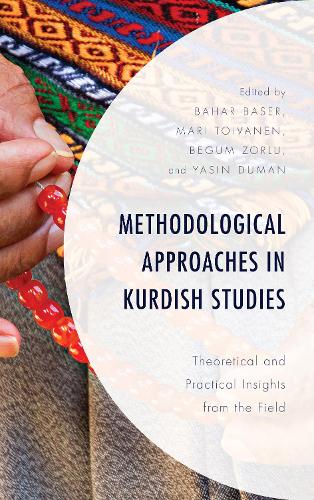
Methodological Approaches in Kurdish Studies: Theoretical and Practical Insights from the Field
(Hardback)
Publishing Details
Methodological Approaches in Kurdish Studies: Theoretical and Practical Insights from the Field
By (Author) Bahar Baser
Edited by Mari Toivanen
Edited by Begum Zorlu
Edited by Yasin Duman
Contributions by Yasemin Gulsum Acar
Contributions by Polat Alpman
Contributions by Demet Arpacik
Contributions by Lana Askari
Contributions by Bahar Baser
Contributions by Marlies Casier
Bloomsbury Publishing PLC
Lexington Books
6th November 2018
United States
Classifications
Professional and Scholarly
Non Fiction
Anthropology
Social and cultural anthropology
909.0491597
Physical Properties
Hardback
282
Width 158mm, Height 229mm, Spine 27mm
599g
Description
This edited volume presents thirteen contributions that reflect upon the practical, ethical, theoretical and methodological challenges that researchers face when conducting fieldwork in settings that are characterized with deteriorating security situations, increasing state control and conflicting inter-ethnic relations. More precisely, they shed light to the intricacies of conducting fieldwork on highly politicized and sensitive topics in the region of Kurdistan in Iraq, Syria and Turkey as well as among Kurdish diaspora members in Europe. This volume is multidisciplinary in its focus and approach. It includes contributions from scholars from various disciplinary backgrounds, ranging from sociology and political science to social psychology and anthropology. The complexity of security situations, and the atmospheres of distrust and suspicion have led the contributors to be creative and to adapt their research methods in ways that at times transcend disciplinary boundaries and conventions. Relatedly, the contributions also open the often-considered Pandoras box of discussing the failures in what is often a messy research field, and how to adopt ones methods to rapidly changing political circumstances. This necessitates greater reflexivity in existing power relations of the surrounding context and how those affect not only the interaction situations between the researcher and the participants, but also raise questions for the overall research process, concerning namely social justice, representation and knowledge production. The contributions unravel this by unpacking positionalities beyond ethnicities, discussing how gendered and other positionalities are constructed in fieldwork interactions and by illustrating how the surrounding structures of power and dominance are present in every-day fieldwork. What differentiates this book from the existing literature is that it is the first academic endeavor that solely focuses on methodological reflections aimed to the field of Kurdish Studies. It offers a comprehensive and multidisciplinary account of scholars fieldwork experiences in the Kurdish regions and as such, it is also of value to scholars conducting or about to conduct fieldwork in conflict regions elsewhere.
Reviews
This book is a timely and much-needed contribution to the growing literature on methodological and ethical challenges involved in conducting research in conflict settings. With a wide range of outstanding contributions from leading scholars, the volume fills an important gap on how ethnographic knowledge is primarily shaped by power relations. It serves as a stark reminder of the need to go beyond a standardized, one-size-fits-all approach to studying complex conflict environments. It is a vital resource for students and scholars of Kurdish studies, Middle Eastern studies, and those interested in conducting research in conflict zones. -- Mehmet Gurses, Florida Atlantic University
Methodological Approaches in Kurdish Studies: Theoretical and Practical Insights from the Field is not only a must read for those interested in Kurdish Studies, but is a reference book for doing research in politically sensitive and unstable contexts. Contributors from various social science disciplines present objective and creative methodologies spanning from ethnographic to archival data. It is the first book in Kurdish Studies on the practical, ethical, theoretical, epistemological, and methodological challenges researchers face and the innovative solutions they come up with while working in and about the stateless Kurds in Turkey, Syria, Iraq and diaspora. -- Aye Betl elik, Sabanc University
This massive volume not only opens new methodological, theoretical and epistemological avenues in the Kurdish studies, but also questions the very meaning of producing social sciences on the risky topics of the 21st Century. -- Hamit Bozarslan, cole des Hautes tudes en Sciences Sociales
For understandable reasons, the field of Kurdish Studies has long been dominated by an overt focus on the politics of the Kurdish Question and Kurdish identity. This has, however, resulted in the neglect of other important areas that merit scholarly attention. For some time, Kurdish studies has lacked self-reflective, critical research on the practice and politics of knowledge production within this field. This well-written edited volume, the first of its kind, makes a timely contribution to our understanding of the practical, methodological and epistemological challenges faced by scholars of Kurdish Studies. -- Welat Zeydanlioglu, Kurdish Studies Network
Author Bio
Bahar Baser is senior research fellow at the Centre for Trust, Peace, and Social Relations. Mari Toivanen is postdoctoral researcher at the University of Turku, Finland. Begum Zorlu is PhD candidate at University of London, City. Yasin Duman is PhD candidate at Coventry University.
